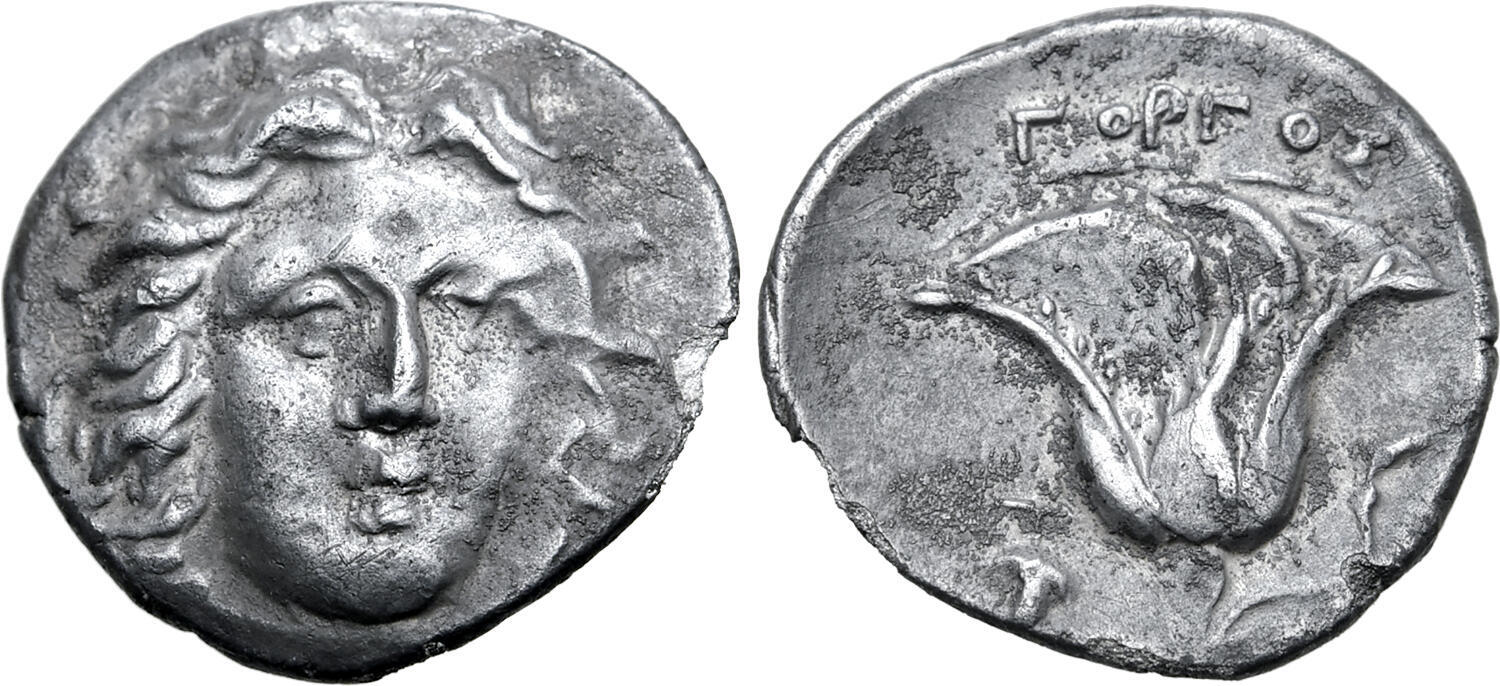H 145 - Thessaly (uncertain mint) (Rhodian power), silver, drachms (185-165 BCE)
From SILVER
185 BCE - 165 BCE Silver 2,018 kg
Description
| ObverseInscription or printing placed on the obverse.: | Facing head of Helios turned slightly to right |
| ReverseInscription or printing placed on the reverse.: | ΓOPΓOΣ above (Greek).Rose with bud to right, grape bunch to lower left |
Mint and issuing power
| MintIdentifies the place of manufacture or issue of a numismatic object.: | Thessaly (uncertain mint) | Ancient regionAncient region.: | Thessaly | Modern countryModern country: Greece | AuthorityIdentifies the issuing power. The authority can be "pretended" when the name or the portrait of X is on the coin but he/she was not the issuing power. It can also be "uncertain" when there is no mention of X on the coin but he/she was the issuing power according to the historical sources: | Rhodian power |
Chronology
| FromIdentifies the initial date in a range assigned in a numismatic context. | 185 BCE | toIdentifies the final date in a range assigned in a numismatic context.. | 165 BCE | PeriodTime period of the numismatic object.: Hellenistic 323-30 BC |
Physical description
| MetalThe physical material (usually metal) from which an object is made.: | Silver |
Median weightMedian of the weights of numismatic objects (in grams). in grams | 2.70 | DenominationTerm indicating the value of a numismatic object. Examples: tetradrachm, chalkous, denarius.: | drachma |
StandardStandard.: | Rhodian |
Image

H145 Thessaly Rhodian.jpg [1]
References
| Die study referencePublication of the study: | Ashton 1988b1Ashton 1988b, p. 21-32, pl. 4-6 | ||
| Coin series referenceReference to coin series study: | RQEMH2RQEMH, n° 145, HGC 63HGC 6, n° 1453 | ||
Obverse dies distribution
| FrequencyFrequency of specimen in distribution. ᵖ | Number of obversesNumber of obverse dies. ᵖ (o) | % (o) | Number of coinsNumber of coins. (n) | % (n) | Die nameName(s) of the die(s). |
| 1 | 9 | 30 | 9 | 9.47 | 2, 3, 4, 15, 18, 24, 28, 29, 30 |
| 2 | 9 | 30 | 18 | 18.95 | 1, 5, 6, 14, 17, 20, 21, 26, 27 |
| 3 | 2 | 6.67 | 6 | 6.32 | 11, 16 |
| 4 | 4 | 13.33 | 16 | 16.84 | 12, 13, 19, 25 |
| 5 | 1 | 3.33 | 5 | 5.26 | 7 |
| 6 | 1 | 3.33 | 6 | 6.32 | 22 |
| 8 | 2 | 6.67 | 16 | 16.84 | 9, 23 |
| 9 | 1 | 3.33 | 9 | 9.47 | 8 |
| 10 | 1 | 3.33 | 10 | 10.53 | 10 |
| Total | 30 of 30 | 99.99 | 95 of 95 | 100 |
Reverse dies distribution
no distribution is available
Quantification
| Number of obversesNumber of obverse dies. ᵖ (o) | 30 | Number of singletons (o1)The number of singleton coins. ᵖ | 9 |
| Number of reverse diesNumber of reverse dies. (r) | 43 | Number of coinsNumber of coins. (n) | 95 |
| Coins per obverse dieNumber of coins per obverse die. (n/o) | 3.17 | Coins per reverse dieNumber of coins per reverse die. (n/r) | 2.21 |
| Reverse per obverse ratioRatio of obverse dies divided by reverse dies. (r/o) | 1.43 | Percentage of singletons (o1)number of coins (n) divided by the number of singletons (o1) ᵖ | 30 % |
| Original number of dies (O) (Carter 1983 formula)The estimation of the number of coins according to Carter 1983 ᵖ | 37.37 | Coins struck if 20,000 as average productivity per dieCoins made if the average productivity for obverses (according to Carter) is 20,000. ᵖ | 747,400 |
| Original number of dies (O) (Esty 2011 formula)The estimation of the number of coins according to the singleton formula in Esty 2011 ᵖ (O) | 43.85 | Survival rate if 20,000 as average productivity per dieSurvival rate if average productivity is 20,000. ᵖ | 0.00013 |
| Coverage (o = % of O) (Esty 1984 formula)Esty 1984 - coverage (% of O) ᵖ (o = % of O) | 90.53% | Die productivity if survival rate 1/2,000Average productivity if survival rate is 1/2,000. ᵖ | 5,084.29 |
| Weight of silver (in kg) if 20,000 coins per die (O = Carter formula)Carter 1983 * Median weight * 20000 (*10 if gold or electrum) ᵖ | 2,018 kg <br /> 2,018 kg | Die productivity if survival rate 1/5,000Average productivity if survival rate is 1/5,000. ᵖ | 12,710.73 |
Remarks
Most likely one single workstation
References
- ^ Ashton, Richard (1988), "A Series of Pseudo-Rhodian Drachms from Mainland Greece", The Numismatic Chronicle, 148, p. 21-32, pl. 4-6.
- ^ Callataÿ, François de (1997), Recueil quantitatif des émissions monétaires hellénistiques, Numismatique Romaine, Wetteren, X + 341 p.
- ^ Hoover, Oliver D. (2010), The Handbook of Greek Coinage Series, volume 6 : handbook of coins of the islands: Adriatic, Iionian, Thracian, Aegean, and Carpathian seas (excluding Crete and Cyprus), sixth to first centuries BC, Lancaster, 358 p.